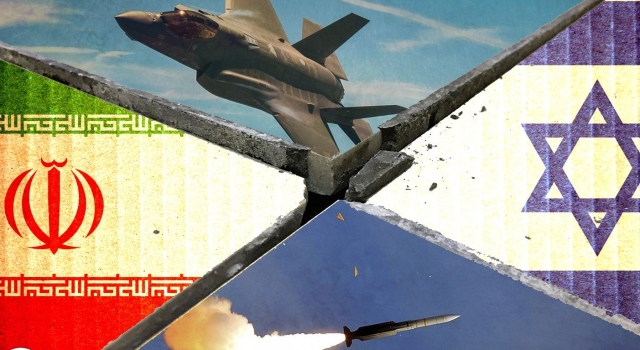In an already volatile Middle East, the atmosphere has thickened with tension as Iran escalates its military readiness to unprecedented levels, issuing stark threats of retaliation against Israel. This comes in the wake of a brazen attack on its consulate in Damascus, an act that has pushed the region to the precipice of a broader conflict, teetering on the edge of erupting at any moment.
The historical backdrop of the Middle East, a mosaic of tension and tumult, has been further complicated by recent events. The assault on the consulate not only disrupted the fragile equilibrium between peace and conflict but also prompted Tehran to vow a response that could reshape the regional dynamics. The nature of this response is critical, for neither Iran nor Israel desires to see the situation spiral into a comprehensive war that could engulf the entire region.
In a move signaling the seriousness of the current standoff, according to several Telegram channels that monitors and reports on Iran, senior commanders of the Iranian military have reportedly sequestered themselves in an underground facility in Isfahan, ominously known as the "Doomsday Bunker". This action underscores the weight of the moment and the heightened state of readiness. The conclusion of Ramadan looms, and with it, the window for Iran's potential retaliation narrows, heightening the anticipation and anxiety among international observers. Despite this, there has been no international condemnation of Tehran's right to respond, a stance that suggests a nuanced understanding of the situation’s complexities.
The global community, while not openly recognizing Iran's right to retalitate, have not made an effort to temper the Islamic Republic's rhetoric about marching to war. There has been some word about diplomatic channels being used to quietly quell Iran's thirst for retaliation, with the United States leveraging intermediaries like Oman and Switzerland to convey messages urging Iran to avoid direct assaults on Israeli diplomatic facilities. Iran's response, as reported by some sources, suggests a conditional openness to avoiding Israeli assets, contingent on a cessation of hostilities in Gaza and an Israeli withdrawal. Israel's temporary troop pullback from parts of Gaza reflects the gravity of the ongoing crisis.
"It's disgusting" that the Biden administration is backing away from Israel at a time when it's at war, Fred Fleitz, a National Security Council chief of staff under former President Donald Trump, said on Newsmax Saturday. https://t.co/t3n478cbYS
— NEWSMAX (@NEWSMAX) April 7, 2024
This crisis has transitioned from a shadow war of proxies to a direct and public confrontation, with Iran unequivocally stating its intention to retaliate in its own name for the damage inflicted upon its diplomatic domain and the loss of senior IRGC members. Expected retaliation in the form of missile or drone strikes on significant targets highlights the escalation from clandestine operations to overt actions.
Yet, the expectation of an Iranian response has not stemmed the tide of low-level engagements. Recent skirmishes have seen Israel and Iran engaging through intermediaries, maintaining a baseline level of hostility that underscores the ongoing tension and the delicate balance of deterrence and retaliation.
The potential for an Iranian retaliation raises critical questions about the future of the region. While some may envision a Middle East devoid of Israel, pragmatic voices within Tehran acknowledge the paradoxical role Israel plays in unifying disparate factions and serving as an outlet for regional discontent. The disappearance of Israel could unravel this delicate balance, reigniting long-standing sectarian divides and potentially destabilizing key initiatives in the region. Another reality that is being contemplated in Tehran is Israel's response to an attack. Many Iranian leaders do not believe that the regime would survive an all out war against Israel, and firmly believe that Israel will declare just that if Iran were to launch ballisitic missiles at the Jewish State.
U.S. intelligence believes Iran is preparing a major attack in retaliation for Monday's deadly airstrike by Israel on the Iranian consulate in Damascus, Syria, CBS News has learned. David Martin has the latest from the Pentagon. https://t.co/1BXCk3B6KC pic.twitter.com/Y7gM6S1oZ3
— CBS Evening News (@CBSEveningNews) April 6, 2024
Iran's calculated response, therefore, must tread a fine line, aiming to assert its stance without provoking an uncontrolled escalation. Israel, known for its resilience, is likely to respond to any aggression, heightening the risk of a cycle of retaliation that could derail any progress towards regional reconciliation. As the specter of war looms, it becomes evident that direct military alliances are unlikely, with nations preferring to maintain a cautious distance. This standoff not only reflects the tensions between Iran and Israel but also the complex web of international relations, with major powers like the US and Russia playing nuanced roles.
The insistence on a direct confrontation by Iran, despite the inherent risks, hints at deeper geopolitical dynamics and external pressures shaping the decisions of regional actors. The anticipated military engagement between Iran and Israel threatens to destabilize the region, creating fissures that could be exploited by various factions.
In the event of an all-out war, the damage Israel will cause to those countries that attack it is tens of times greater than their ability to harm Israel.
— Avraham Israeli Zionist 🇮🇱🇨🇦 (@IsraeliAvraham) April 8, 2024
Should Iran be afraid of Israel's long-range attack capabilities? https://t.co/B8hqEMbidn
In this intricate geopolitical puzzle, the motivations and consequences of conflict are multifaceted, involving not just the primary actors but also a range of regional and international stakeholders. The situation is a testament to the complex interplay of diplomacy, military strategy, and the unceasing quest for stability in a region that remains at the heart of global attention.


